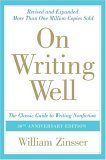Book Recommendation: On Writing Well
Since I started FollowSteph.com about two years I’ve been reading a lot on how to improve the quality of my writing. So far the best resource I’ve ever come across is the book On Writing Well – The Classic Guide to Writing Non-Fiction by William Zinsser. If you haven’t already read a copy, you absolutely should! This book is amazing and filled with great advice that will improve your writing skills.
I’ve only read it a month ago and already I’ve applied many of the suggestions he offers. This is not saying that I’m a great writer, only that I can always improve myself and this book has clearly shown me some great ways to achieve this. Sometimes his advice is subtle and other times it can be so obvious that you can’t understand why you never saw it.
On my last blog entry How to Write Out Your Domain Name, I made several edits directly attributable to this book. For example the beginning of the last paragraph of the blog entry starts with: “It’s only a matter of time before uppercasing each word in a domain becomes the standard…”. In my first draft I had started it with “I’m willing to bet that it’s only a matter…”. I changed it because in On Writing Well the author suggests:
“Don’t say you were a bit confused and sort of tired and a little depressed and somewhat annoyed. Be confused. Be tired. Be depressed. Be annoyed. Don’t hedge your prose with little timidities. Good writing is lean and confident”.
I couldn’t agree more. If you look at the last draft it’s much more powerful without the “I’m willing to bet that” beginning. It’s obvious when you read it, but I doubt I would have noticed it if it wasn’t for the book. After all, we all do it, it’s just that the book brings it to your attention. It’s part of evolving your writing and making it better. Learning something each day.
As another example, in the second paragraph I state “Back in the old day, which in internet time is less than a decade ago, everyone wrote out their domain names in all lowercase.” Before having read the book On Writing Well I would have finished this sentence with an exclamation mark, mostly to get across the light humor I embedded in the sentence. However after reading this suggestion from William I decided not to:
“Also resist using an exclamation point to notify the reader that you are making a joke or being ironic. … Readers are annoyed by your reminder that this was a comical moment. They are also robbed of the pleasure of finding it funny on their own. Humor is best achieved by understatement, and there’s nothing subtle about an exclamation point.”
Although not everything he says should be taken as a rule, which even William himself states, I really respect his advice. He offers examples for each of his suggestions to show the difference. More importantly though, is that when I now read other authors I really enjoy, I notice some of these suggestions in their writing. A great example of how to properly embed humor in your content is just about anything written by Joel Spolsky from Joel On Software. He does exactly what William suggests, he doesn’t force out the comedy, it lets the reader pick it up on their own.
These aren’t the only tips the book offers, it’s loaded with great advice on how to improve your writing skills, be it for blogging, business, etc. What I’ve described above is just two small examples of many that I learned from reading On Writing Well. If you haven’t already read it, I strongly suggest you do.



